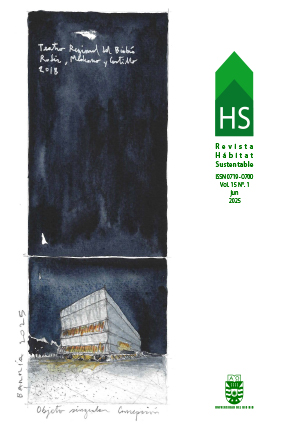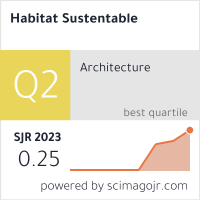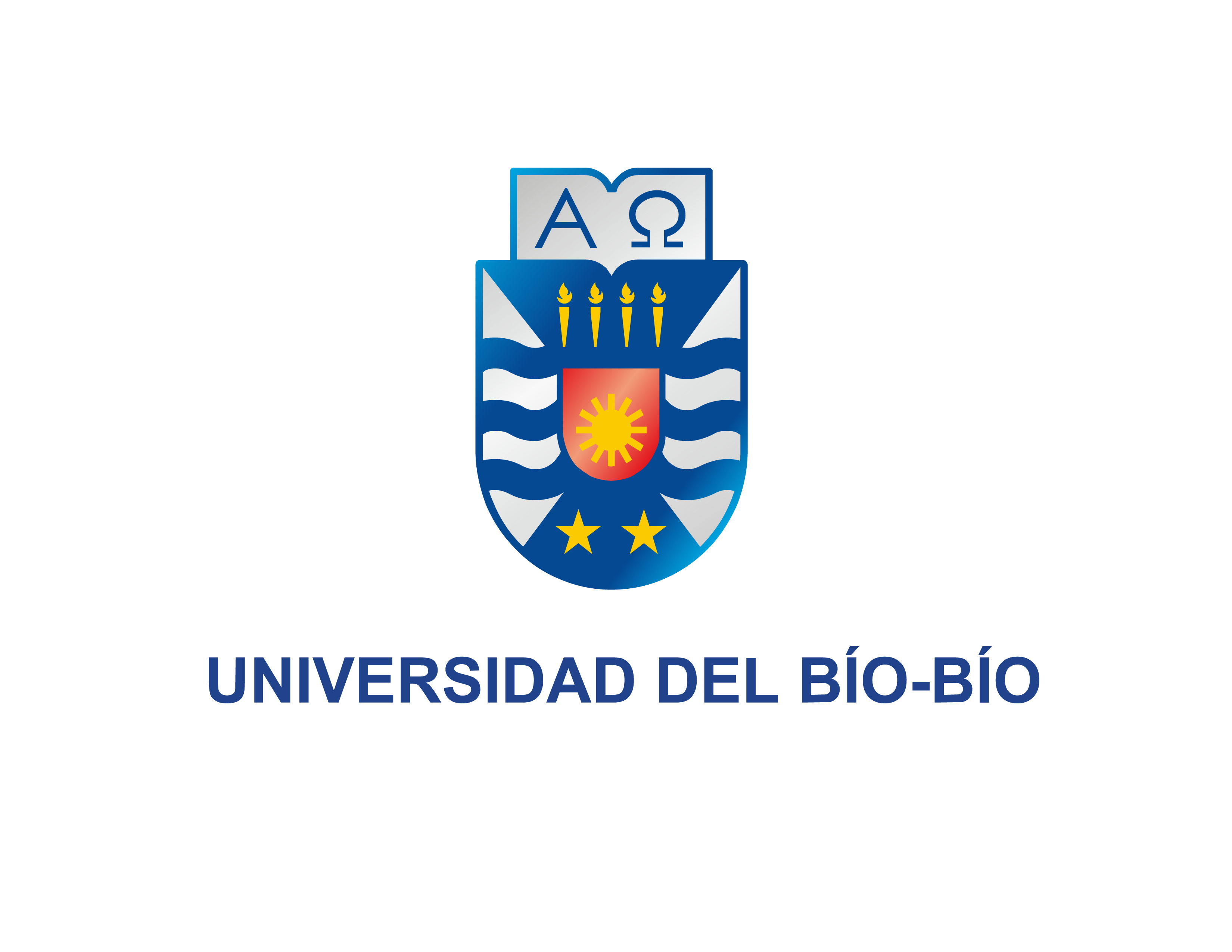Investigación de aplicaciones de microalgas en fachadas de edificios: una perspectiva bibliométrica
DOI:
https://doi.org/10.22320/07190700.2025.15.01.10Palabras clave:
microalgas, fotobiorreactor, arquitectura sostenible, diseño de fachadas, análisis bibliométrico, biomasa, producción de energíaResumen
Las microalgas son microorganismos con un gran potencial para su aplicación en tecnologías medioambientales sustentables por su capacidad de fotosintetizar, producir biomasa, absorber dióxido de carbono y tratar aguas residuales. Estas propiedades versátiles permiten integrar las microalgas en los sistemas arquitectónicos de fachadas. Los fotobiorreactores que pueden integrarse en la fachada cumplen funciones como la generación de energía, la mejora de la calidad del aire, el sombreado y el tratamiento de aguas residuales. En este contexto, aunque existen muchos estudios bibliométricos en la literatura sobre el uso de microalgas en los campos medioambiental e industrial, no hay ningún estudio bibliométrico exhaustivo que se centre en el uso de microalgas en diseños de fachadas arquitectónicas. Este estudio pretende revelar sistemáticamente las tendencias de la investigación en este campo examinando la bibliografía sobre el uso de microalgas en fachadas de edificios y sistemas de revestimiento mediante un análisis bibliométrico. Según los resultados de la investigación, la literatura científica sobre el uso de microalgas en fachadas de edificios ha aumentado rápidamente en los últimos años con colaboraciones interdisciplinarias y se centra en los temas de sustentabilidad, eficiencia energética e interacción biológica. Los estudios publicados entre 2012 y 2024, liderados por países como Alemania, Estados Unidos, China y Países Bajos, se configuran en torno a palabras clave como microalgas, biorreactor, fachada verde, y biointegración, centrados en la eficiencia energética, la sustentabilidad y la biotecnología de la construcción. Como resultado, esta investigación hace visible la posición actual de las tecnologías de microalgas y ofrece recomendaciones estratégicas para orientar futuros trabajos académicos.
Descargas
Citas
AHMADI, F., WILKINSON, S., REZAZADEH, H., KEAWSAWASVONG, S., NAJAFI, Q., & MASOUMI, A. (2023). Energy efficient glazing: A comparison of microalgae photobioreactor and Iranian Orosi window designs. Building and Environment, 233, 109942. https://doi.org/10.1016/j.buildenv.2022.109942 DOI: https://doi.org/10.1016/j.buildenv.2022.109942
ARBYE, S., ARIANTI, R. F., PRADANA, Y. S., SUYONO, E. A., KOERNIAWAN, M. D., SUWANTI, L. T., SIREGAR, U. J., & BUDIMAN, A. (2020). The design of microalgae (Chlorella sp.) photobioreactor as a façade bus shelter building in Indonesia. AIP Conference Proceedings, 2296(1), 020007. https://doi.org/10.1063/5.0030408 DOI: https://doi.org/10.1063/5.0030408
ARORA, R., SUDHAKAR, K., & RANA, R. S. (2024). Photobioreactors for building integration: A overview of designs and architectural potential. Heliyon, 10(15), e35168. https://doi.org/10.1016/j.heliyon.2024.e35168 DOI: https://doi.org/10.1016/j.heliyon.2024.e35168
BILORIA, N., & THAKKAR, Y. (2020). Integrating algae building technology in the built environment: A cost and benefit perspective. Frontiers of Architectural Research, 9(2), 370-384. https://doi.org/10.1016/j.foar.2019.12.004 DOI: https://doi.org/10.1016/j.foar.2019.12.004
BITOG, J. P., LEE, I. B., LEE, C. G., KIM, K. S., HWANG, H. S., HONG, S. W., SEO, I.-H., KWON, K.-S. & MOSTAFA, E. (2011). Application of computational fluid dynamics for modeling and designing photobioreactors for microalgae production: a review. Computers and electronics in agriculture, 76(2), 131-147. https://doi.org/10.1016/j.compag.2011.01.015 DOI: https://doi.org/10.1016/j.compag.2011.01.015
CARVALHO, J. C. M., MATSUDO, M. C., BEZERRA, R. P., FERREIRA-CAMARGO, L. S., & SATO, S. (2014). Microalgae Bioreactors. In R. Bajpai, A. Prokop & M. Zappi (Eds.). Algal Biorefineries: Volume 1: Cultivation of Cells and Products (pp. 83–126). Springer. https://doi.org/10.1007/978-94-007-7494-0 DOI: https://doi.org/10.1007/978-94-007-7494-0_4
ELMALKY, A. M., & ARAJI, M. T. (2024a). Kinetics model with experimental validation for optimal microalgae generation in double-skin façades. Energy, 311, 133335. https://doi.org/10.1016/j.energy.2024.133335 DOI: https://doi.org/10.1016/j.energy.2024.133335
ELMALKY, A. M., & ARAJI, M. T. (2024b). Optimization models for photosynthetic bioenergy generation in building façades. Renewable Energy, 228, 120607. https://doi.org/10.1016/j.renene.2024.120607 DOI: https://doi.org/10.1016/j.renene.2024.120607
ELRAYIES, G. M. (2018). Microalgae: Prospects for greener future buildings. Renewable and Sustainable Energy Reviews, 81(1), 1175-1191. https://doi.org/10.1016/j.rser.2017.08.032 DOI: https://doi.org/10.1016/j.rser.2017.08.032
GAO, C., XIN, H., YANG, S., LI, Z., LIU, S., XU, B., ZHANG, T., DUTTA, S., & TANG, Y. (2022). Trends and performances of the algal biofuel: a bibliometric approach. Journal of Environmental Engineering and Landscape Management, 30(2), 284-300. https://doi.org/10.3846/jeelm.2022.16746 DOI: https://doi.org/10.3846/jeelm.2022.16746
GIRARD, F., TOUBLANC, C., ANDRES, Y., DECHANDOL, E., & PRUVOST, J. (2023). System modeling of the thermal behavior of a building equipped with facade-integrated photobioreactors: Validation and comparative analysis. Energy and Buildings, 292, 113147. https://doi.org/10.1016/j.enbuild.2023.113147 DOI: https://doi.org/10.1016/j.enbuild.2023.113147
GOL, N., TAGHAVIJELOUDAR, M., JALILIAN, N., & REZANIA, S. (2025). Microalgae cultivation in semi-transparent photovoltaic bioreactor for sustainable power generation, wastewater treatment and biodiesel production. Energy Conversion and Management, 325, 119417. https://doi.org/10.1016/j.enconman.2024.119417 DOI: https://doi.org/10.1016/j.enconman.2024.119417
HASNAN, M. T. I. M. T., & ZAHARIN, P. M. B. (2020). Exploration of microalgae photobioreactor (PBR) in tropical climate building envelope. Environment-Behaviour Proceedings Journal, 5(14), 263-278. https://doi.org/10.21834/ebpj.v5i14.2166 DOI: https://doi.org/10.21834/ebpj.v5i14.2166
HUANG, Q., JIANG, F., WANG, L., & YANG, C. (2017). Design of photobioreactors for mass cultivation of photosynthetic organisms. Engineering, 3(3), 318-329. https://doi.org/10.1016/J.ENG.2017.03.020 DOI: https://doi.org/10.1016/J.ENG.2017.03.020
KINAWY, R. N., FATHY, W., HAMMOUDA, O., ABDELHAMEED, M. S., SAYED, A. F., & SHABAN, A. M. (2024). Revealing the utilization of microalgae in cosmetics: insights from a comprehensive scientometric analysis over the last two decades. International Aquatic Research, 16(4), 375-397. http://doi.org/10.22034/iar.2024.2008952.1753
LI, Z., & ZHU, L. (2021). The scientometric analysis of the research on microalgae-based wastewater treatment. Environmental Science and Pollution Research, 28, 25339-25348. http://doi.org/10.1007/s11356-021-12348-4 DOI: https://doi.org/10.1007/s11356-021-12348-4
MELO, J. M., RIBEIRO, M. R., TELLES, T. S., AMARAL, H. F., & ANDRADE, D. S. (2022). Microalgae cultivation in wastewater from agricultural industries to benefit next generation of bioremediation: a bibliometric analysis. Environmental Science and Pollution Research, 29(15), 22708-22720. https://doi.org/10.1007/s11356-021-17427-0 DOI: https://doi.org/10.1007/s11356-021-17427-0
METWALLY, W. M., & IBRAHIM, V. A. R. (2024). The Integration of Bio-Active Elements into Building Façades as a Sustainable Concept. Buildings, 14(10), 3086. https://doi.org/10.3390/buildings14103086 DOI: https://doi.org/10.3390/buildings14103086
NEGEV, E., YEZIORO, A., POLIKOVSKY, M., KRIBUS, A., CORY, J., SHASHUA-BAR, L., & GOLBERG, A. (2019). Algae Window for reducing energy consumption of building structures in the Mediterranean city of Tel-Aviv, Israel. Energy and Buildings, 204, 109460. https://doi.org/10.1016/j.enbuild.2019.109460 DOI: https://doi.org/10.1016/j.enbuild.2019.109460
NWOBA, E. G., PARLEVLIET, D. A., LAIRD, D. W., ALAMEH, K., & MOHEIMANI, N. R. (2020). Pilot-scale self-cooling microalgal closed photobioreactor for biomass production and electricity generation. Algal Research, 45, 101731. https://doi.org/10.1016/j.algal.2019.101731 DOI: https://doi.org/10.1016/j.algal.2019.101731
ÖNCEL, S. Ş., KÖSE, A., & ÖNCEL, D. Ş. (2016). 11 - Façade integrated photobioreactors for building energy efficiency. Start-Up Creation, The Smart Eco-Efficient Built Environment, 237-299. https://doi.org/10.1016/B978-0-08-100546-0.00011-X DOI: https://doi.org/10.1016/B978-0-08-100546-0.00011-X
PRISMA. (2020). PRISMA 2020. https://www.prisma-statement.org/
PRUVOST, J., LE GOUIC, B., LEPINE, O., LEGRAND, J., & LE BORGNE, F. (2016). Microalgae culture in building-integrated photobioreactors: Biomass production modelling and energetic analysis. Chemical Engineering Journal, 284, 850-861. https://doi.org/10.1016/j.cej.2015.08.118 DOI: https://doi.org/10.1016/j.cej.2015.08.118
PURBA, L. D. A., SUSANTI, H., ADMIRASARI, R., PRAHARYAWAN, S., & IWAMOTO, K. (2024). Bibliometric insights into microalgae cultivation in wastewater: Trends and future prospects for biolipid production and environmental sustainability. Journal of Environmental Management, 352, 120104. https://doi.org/10.1016/j.jenvman.2024.120104 DOI: https://doi.org/10.1016/j.jenvman.2024.120104
REZAZADEH, H., KORDJAMSHIDI, M., AHMADI, F., & ESKANDARINEJAD, A. (2021). Use of double-glazed window as a photobioreactor for CO 2 removal from air. Environmental Engineering Research, 26(2), 200122. https://doi.org/10.4491/eer.2020.122 DOI: https://doi.org/10.4491/eer.2020.122
RUMIN, J., NICOLAU, E., GONÇALVES DE OLIVEIRA JUNIOR, R., FUENTES-GRÜNEWALD, C., FLYNN, K. J., & PICOT, L. (2020). A bibliometric analysis of microalgae research in the world, Europe, and the European Atlantic area. Marine Drugs, 18(2), 79. https://doi.org/10.3390/md18020079 DOI: https://doi.org/10.3390/md18020079
SARMADI, H., & MAHDAVINEJAD, M. (2023). A designerly approach to Algae-based large open office curtain wall Façades to integrated visual comfort and daylight efficiency. Solar Energy, 251, 350-365. https://doi.org/10.1016/j.solener.2023.01.021 DOI: https://doi.org/10.1016/j.solener.2023.01.021
SCHERER, K., STIEFELMAIER, J., STRIETH, D., WAHL, M., & ULBER, R. (2020). Development of a lightweight multi-skin sheet photobioreactor for future cultivation of phototrophic biofilms on facades. Journal of Biotechnology, 320, 28-35. https://doi.org/10.1016/j.jbiotec.2020.06.004 DOI: https://doi.org/10.1016/j.jbiotec.2020.06.004
SEDIGHI, M., POURMOGHADDAM QHAZVINI, P., & AMIDPOUR, M. (2023). Algae-powered buildings: A review of an innovative, sustainable approach in the built environment. Sustainability, 15(4), 3729. https://doi.org/10.3390/su15043729 DOI: https://doi.org/10.3390/su15043729
SILVA, S. C., FERREIRA, I. C., DIAS, M. M., & BARREIRO, M. F. (2020). Microalgae-derived pigments: A 10-year bibliometric review and industry and market trend analysis. Molecules, 25(15), 3406. http://doi.org/10.3390/molecules25153406 DOI: https://doi.org/10.3390/molecules25153406
SINGH, S. P., & SINGH, P. (2015). Effect of temperature and light on the growth of algae species: A review. Renewable and sustainable energy reviews, 50, 431-444. https://doi.org/10.1016/j.rser.2015.05.024 DOI: https://doi.org/10.1016/j.rser.2015.05.024
TALAEI, M., & PRIETO, A. (2024a). A review on performance of sustainable microalgae photobioreactor façades technology: exploring challenges and advantages. Architectural Science Review, 67(5), 387-414. https://doi.org/10.1080/00038628.2024.2305889 DOI: https://doi.org/10.1080/00038628.2024.2305889
TALAEI, M., MAHDAVINEJAD, M., AZARI, R., PRIETO, A., & SANGIN, H. (2021). Multi-objective optimization of building-integrated microalgae photobioreactors for energy and daylighting performance. Journal of Building Engineering, 42, 102832. https://doi.org/10.1016/j.jobe.2021.102832 DOI: https://doi.org/10.1016/j.jobe.2021.102832
TALAEI, M., & SANGIN, H. (2024b). Thermal comfort, daylight, and energy performance of envelope-integrated algae-based bioshading and static shading systems through multi-objective optimization. Journal of Building Engineering, 90, 109435. https://doi.org/10.1016/j.jobe.2024.109435 DOI: https://doi.org/10.1016/j.jobe.2024.109435
TALAEI, M., MAHDAVINEJAD, M., AZARI, R., HAGHIGHI, H. M., & ATASHDAST, A. (2022). Thermal and energy performance of a user-responsive microalgae bioreactive façade for climate adaptability. Sustainable Energy Technologies and Assessments, 52, 101894. https://doi.org/10.1016/j.seta.2021.101894 DOI: https://doi.org/10.1016/j.seta.2021.101894
TODISCO, E., LOUVEAU, J., THOBIE, C., DECHANDOL, E., HERVÉ, L., DURÉCU, S., TITICA, M., & PRUVOST, J. (2022). A dynamic model for temperature prediction in a façade-integrated photobioreactor. Chemical Engineering Research and Design, 181, 371-383. https://doi.org/10.1016/j.cherd.2022.03.017 DOI: https://doi.org/10.1016/j.cherd.2022.03.017
UGWU, C. U., AOYAGI, H., & UCHIYAMA, H. (2008). Photobioreactors for mass cultivation of algae. Bioresource technology, 99(10), 4021-4028. https://doi.org/10.1016/j.biortech.2007.01.046 DOI: https://doi.org/10.1016/j.biortech.2007.01.046
UMDU, E. S. & UNIV, Y. (2020). 12- Building Integrated Photobioreactor. Bio-Based Materials and Biotechnologies for Eco-Efficient Construction. https://doi.org/10.1016/b978-0-12-819481-2.00012-x DOI: https://doi.org/10.1016/B978-0-12-819481-2.00012-X
VAJDI, S., & ASLANI, A. (2023). Design and techno-economic analysis of direct CO2 capturing with integrated photobioreactors as a building façade. Sustainable Energy Technologies and Assessments, 56, 103068. https://doi.org/10.1016/j.seta.2023.103068 DOI: https://doi.org/10.1016/j.seta.2023.103068
VILLALBA, M. R., CERVERA, R., & SÁNCHEZ, J. (2023). Green solutions for urban sustainability: photobioreactors for algae cultivation on façades and artificial trees. Buildings, 13(6), 1541. https://doi.org/10.3390/buildings13061541 DOI: https://doi.org/10.3390/buildings13061541
WANG, B., LAN, C. Q., & HORSMAN, M. (2012). Closed photobioreactors for production of microalgal biomasses. Biotechnology advances, 30(4), 904-912. https://doi.org/10.1016/j.biotechadv.2012.01.019 DOI: https://doi.org/10.1016/j.biotechadv.2012.01.019
WOO, D.-O., LEE, D., & LEE, S. (2022). Parametric design study of a proposed photobioreactor-integrated vertical louver system for energy-efficient buildings. Journal of Green Building, 17(3), 33-61. https://doi.org/10.3992/jgb.17.3.33 DOI: https://doi.org/10.3992/jgb.17.3.33
WU, C., HERBST, G., LUJAN, A., & KIM, K. H. (2022, July). A Stochastic Approach To Simulate And Optimize The Coating Uniformity Of Rotational Molding for Microalgae Facades. In 2022 Annual Modeling and Simulation Conference (ANNSIM) (pp. 569-580). IEEE. http://doi.org/10.23919/ANNSIM55834.2022.9859444 DOI: https://doi.org/10.23919/ANNSIM55834.2022.9859444
YAMAN, Y., TOKUÇ, A., DENIZ, İ., EZAN, M. A., KÖKTÜRK, G., DALAY, M. C., & DEMIREL, Z. (2024). Photobioreactor facade panels: enhancing comfort, reducing energy use, and capturing carbon in temperate continental climates. Systems Microbiology and Biomanufacturing, 5, 357-370. https://doi.org/10.1007/s43393-024-00300-9 DOI: https://doi.org/10.1007/s43393-024-00300-9
YILMAZ, H. K. (2006). Mikroalg Üretimi İçin Fotobiyoreaktör Tasarımları. Ege Journal of Fisheries and Aquatic Sciences, 23(2), 327-332. http://www.egejfas.org/tr/download/article-file/57730
YOO, J. J., CHOI, S. P., KIM, J. Y., CHANG, W. S., & SIM, S. J. (2013). Development of thin-film photo-bioreactor and its application to outdoor culture of microalgae. Bioprocess and biosystems engineering, 36(6), 729-736. http://doi.org/10.1007/s00449-013-0898-2 DOI: https://doi.org/10.1007/s00449-013-0898-2
Descargas
Publicado
Cómo citar
Número
Sección
Licencia
Derechos de autor 2025 Aslı Taş, Güneş Mutlu-Avinç

Esta obra está bajo una licencia internacional Creative Commons Atribución-CompartirIgual 4.0.
El contenido de los artículos que se publican en cada número de Hábitat Sustentable, es responsabilidad exclusiva de los autores y no representan necesariamente el pensamiento ni comprometen la opinión de la Universidad del Bío-Bío.
Los autores/as conservarán sus derechos de autor y garantizarán a la revista el derecho de primera publicación de su obra, el cuál estará simultáneamente sujeto a la Licencia de Reconocimiento de Creative Commons CC BY-SA que permite a otros compartir-copiar, transformar o crear nuevo material a partir de esta obra con fines no comerciales, siempre y cuando se reconozcan la autoría y la primera publicación en esta revista, y sus nuevas creaciones estén bajo una licencia con los mismos términos.











 Programa de Información Científica/Concurso Fondos de Publicación de Revistas Científicas 2018/ Proyecto Mejoramiento de Visibilidad de Revistas UBB (Código:FP180007)
Programa de Información Científica/Concurso Fondos de Publicación de Revistas Científicas 2018/ Proyecto Mejoramiento de Visibilidad de Revistas UBB (Código:FP180007) 





